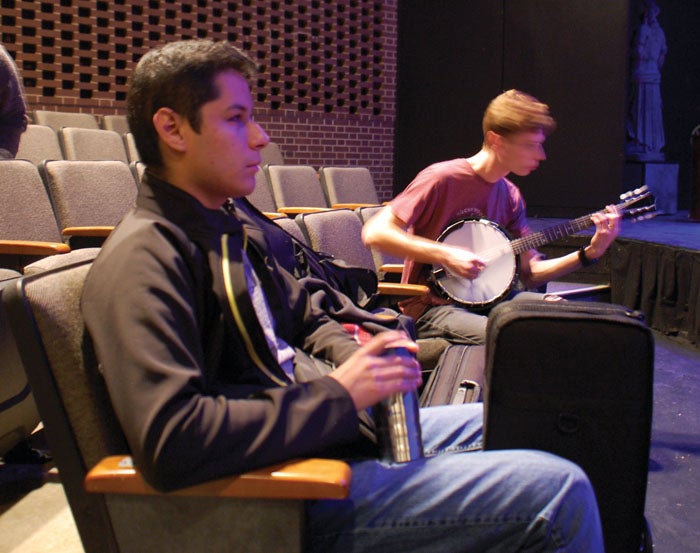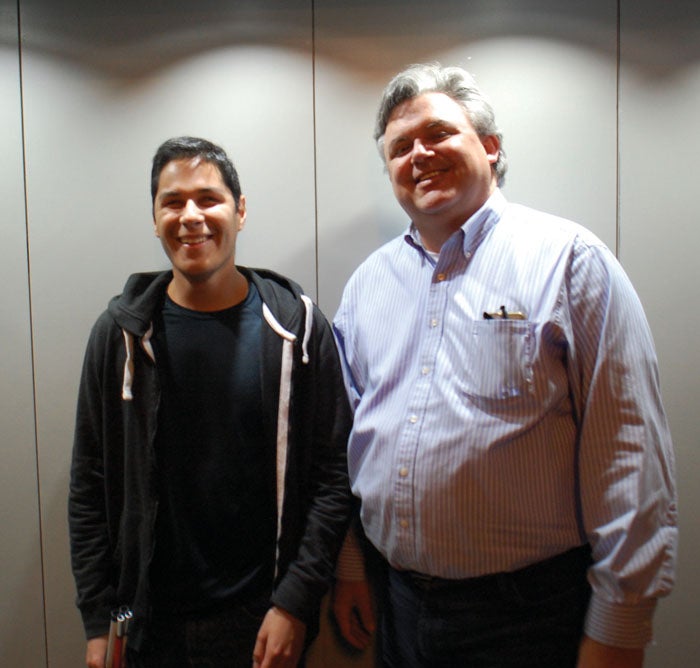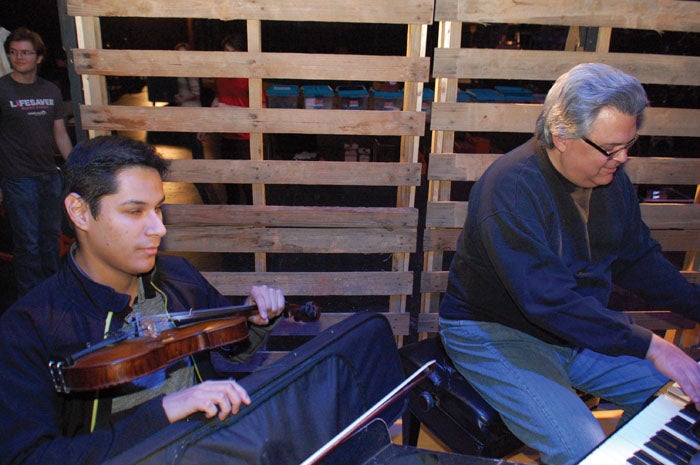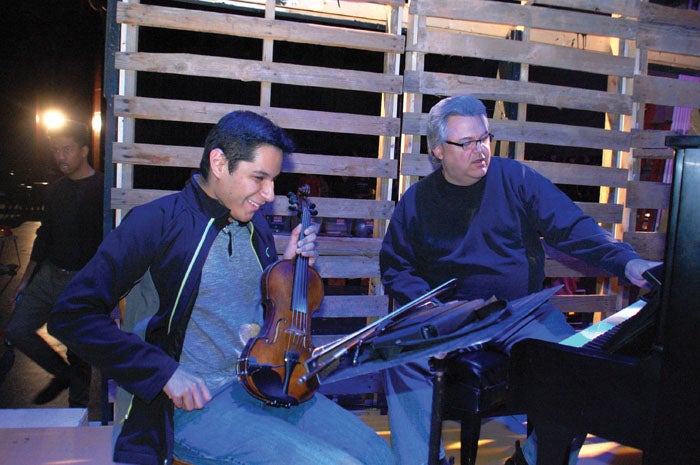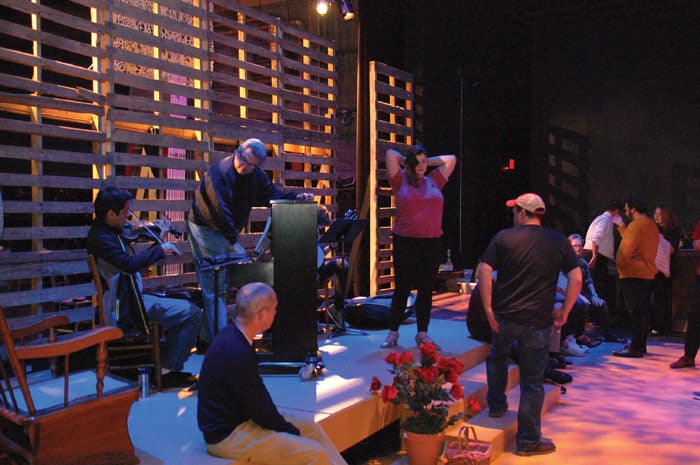Angelic notes: With help of mentor, blind Catawba College fiddler takes on ‘Bright Star’ musical
Published 12:00 am Sunday, November 17, 2019
SALISBURY — Years from now, maybe sooner rather than later, Catawba College senior Angel Paez pictures himself being in demand as a session artist.
Could be he’ll be reporting regularly to music studios, playing anything from keyboards to guitars, maybe even singing a bit. These days, he leans heavily toward country and bluegrass.
So having the chance to play fiddle in the bluegrass orchestra John Stafford has assembled for this week’s Catawba College production of “Bright Star” is right in Paez’s wheelhouse.
During the show, Paez and the other band members will look as though they’re sitting on a front porch, having a jam session. They’ll be taking their cues from music director Stafford, who’ll also be on the piano.
Paez will sit closest to Stafford, right on his hip.
They’re a team, so to speak, because Paez has been blind since birth, and playing any instrument for a full-scale musical is not the easiest thing when you can’t follow the book with the other musicians.
“It’s what I expected it to be,” Paez says. “I knew I just couldn’t show up and do it. I guess that’s why I looked forward to it. Part of the fun to me is figuring out the music as we go.”
From the start of rehearsals, Paez and Stafford have been at the back of the stage nightly as Stafford describes what’s happening and Paez memorizes the score and takes notes on a Braille computer.
“He’s got his notes just like the rest of us have sheet music,” Stafford says. “… He said, ‘There’s no way.’ And I said, ‘You and I are going to invent a way for a blind man to read music.'”
The constant back-and-forth between Stafford and his fiddle player, the note-taking on sequences and keys, resending of documents, memorizing and Paez’s ear for the music all seem to be working.
The improvised nature of bluegrass music also helps.
With instruction and cues from Stafford such as “double the melody on top,” “Angel, yours is the alto line,” “chop,” “rocking” and “whole notes,” Paez knows how he should be playing in each scene.
“Those are the ways he’s thinking — not just plain C, D and F,” Stafford says.
Stafford remembers going to “Bright Star” director David Pulliam about using Paez as his fiddler. Stafford confided to Pulliam it would be a challenge, requiring Paez and him to be at every rehearsal — and still with no guarantee it would work.
As with most everyone else on the Catawba College campus, Pulliam already appreciated how talented Paez is.
“I was excited about it,” Pulliam says. “When John brought it up, I was enthusiastic.”
The student performers in the “Bright Star” cast also were thrilled with the idea, according to Pulliam. Paez says that makes him feel 100 times better.
“They’ve been real supportive of having me on board,” he adds.
Paez acknowledges he will have as many butterflies going into Wednesday night’s first show as the actors. But Stafford — his mentor and friend — has known Paez for three years now and is sure he can do it.
The 21-year-old musician has perfect pitch, is a great singer and can play any instrument with strings. And all of Paez’s talent is secondary, Stafford says, to his being one of the finest people he has ever met.
“He’s the total package,” Stafford says.
Angel Paez grew up in Charlotte. He says there’s a long name for the blindness he was born with, but essentially he has two detached retinas.
He thinks he was first introduced to music when he was 2 or 3, “and Santa got me a little keyboard at Christmas.”
As a boy, Paez developed his ear for music by paying close attention at church, and he basically taught himself how to play instruments such as guitar, piano and violin, though he received some instruction in violin in middle school.
He played everything by ear, and he says it wasn’t until he reached Catawba that he learned how to play his instruments better ergonomically.
“I probably made things a lot harder than I should have,” Paez says of the playing styles he had developed. “There were a dozen easier ways I could have done it.”
His parents and two sisters are not as devoted to music as he is. He says his mother “can carry a tune,” particularly in Sunday church. For a while, his younger sister also did well with the violin.
As a youngster, Paez sang a lot — “I was the only loud one in the house,” he says, laughing. He entered radio singing contests and also sang in church, all the while attending public school.
In school, he participated in choirs, played in high school ensembles and honed his skills on many instruments.
Paez started learning Braille as a pre-schooler. He adapted to the computer and audio technology allowing him to read books, type and take notes. In college, he uses an online subscription to order certain texts in Braille, or he finds the audio books he needs.
His Catholic church meant a lot toward putting him on his musical path.
“It has definitely been a big part of my life,” he says.
As a Myers Park High School senior, Paez says he was scared about even applying to college, unsure how he would navigate a campus on his own. He had another concern:
“I didn’t want people to be bothered by me.”
His parents and a Myers Park teacher encouraged him not to dismiss the idea of college.
It wasn’t until late in his senior year that a simple Google search led him to learn about Catawba College and its music program. Paez had good grades and a decent SAT score. He applied to Catawba and within a couple of weeks was accepted.
He remembers touring the campus in June of that year.
“It’s been probably the best thing for me so far,” Paez says of his decision. “… People here have been absolutely super. It feels like I just got here.”
Paez is part of the popular music program, which includes artist development shows to showcase students’ talents. He hasn’t written a lot of songs himself, declaring he’s a better instrumentalist than a wordsmith.
Armed with a rich baritone voice, he has sung in all three campus choirs and is part of a bluegrass club.
Stafford remembers the time he first asked Paez to sing at First Presbyterian Church, where Stafford is the music director.
When he was finished, the congregation gave him a standing ovation — something Stafford thought Paez should know when he walked up to him at the microphone.
‘That’s the effect he has every time he does something,” Stafford says.
In 2018, Paez played electric guitar as part of the band supporting then rising Catawba College senior Dustin Chapman, who won the Carolina Country Music Festival’s Battle of the Bands for the Myrtle Beach region.
A Catawba College graduate himself, Stafford has formed a close bond with Paez, who is in his third year as a Catawba College scholar at First Presbyterian Church. During school years, Paez has sung and played instruments every Sunday at the church, usually for its contemporary service.
He, Stafford and the six other Catawba College scholars at First Presbyterian practice on Wednesdays and make key musical contributions at both services every Sunday.
Stafford wanted Paez to try “Bright Star” because he believes every different thing a musician can do leads to more opportunities down the road.
“I love Angel, and I wanted him to have this unique opportunity that, frankly, he may never have again,” Stafford says.
Stafford, along with the students and faculty at Catawba, have never stopped pushing him to be a better person and better musician, Paez says, “and I appreciate all of that.”
Now, not unlike Paez himself, comes an opportunity called “Bright Star.”
“It’s awesome,” he says. “I love it.”
Contact Mark Wineka at 704-797-4263 or mark.wineka@salisburypost.com.


